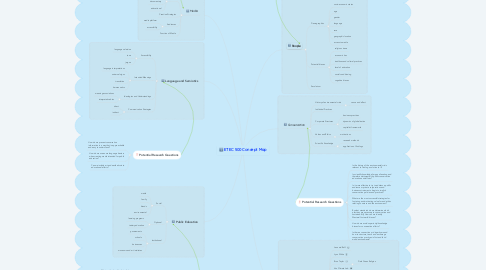
1. Media
1.1. Types
1.1.1. entertainment
1.1.2. advertising
1.1.3. documentary
1.1.4. educational
1.2. Creation Strategies
1.3. Audiences
1.3.1. media platform
1.3.2. accessibility
1.4. Function of Media
2. Language and Semiotics
2.1. Accessibility
2.1.1. language selection
2.1.2. tone
2.1.3. jargon
2.2. Intended Meanings
2.2.1. language interpretations
2.2.2. universal signs
2.2.3. translation
2.2.4. hermenuetics
2.3. Ideologies and Understandings
2.3.1. meaning associations
2.3.2. interpretative bias
2.4. Communication Strategies
2.4.1. direct
2.4.2. indirect
3. Public Education
3.1. Social
3.1.1. media
3.1.2. family
3.1.3. friends
3.1.4. environmental
3.2. Optional
3.2.1. learning programs
3.2.2. tertiary education
3.3. Institutional
3.3.1. governments
3.3.2. schools
3.3.3. businesses
3.3.4. museums and art institutes
4. Potential Research Questions
4.1. How do media cultures differ?
4.2. Is an explicit or implicit focus on conservation tactics more effective?
4.3. Does media need to be created for a specific audience to be effective?
4.4. Will the genre/type of media affect its accessibility?
4.5. What are the best media sharing platforms for reaching the largest groups?
4.6. What pre-existing content speaks to the conservation narrative or carries environmental value?
5. Potential Research Questions
5.1. What are the benefits of implicit versus explicit education strategies for conservation and sustainability pracatices in public environments?
5.2. What are the, if any, laws and governance around sharing of knowledge and information in public spaces?
5.3. What are the spaces in which media based educational efforts will be accessed by the public?
5.4. Have there been any particularly successful campaigns around conservation that can be considered as a framework for future efforts?
5.5. How can we integrate scientific and environmental knowledge, sustainability education and conservation tactics into the pre-existing schooling systems?
5.6. What are the expected audiences and social groups in the public environment of the expected conservation campaign?
6. Potential Research Questions
6.1. How do we present conservation information in a way that is approachable and easy to understand?
6.2. How do we overcome language barriers when creating media intended for public education?
6.3. Can we include art and aesthetics into educational efforts?
7. People
7.1. Demographics
7.1.1. socio-economic status
7.1.2. age
7.1.3. gender
7.1.4. language
7.1.5. race
7.1.6. geographic location
7.1.7. access to media
7.2. Potential biases
7.2.1. religious views
7.2.2. economic ties
7.2.3. traditions and cultural practices
7.2.4. level of education
7.2.5. social conditioning
7.2.6. cognitive biases
7.3. Secularism
8. Conservation
8.1. History of environmental crisis
8.1.1. cause and effect
8.2. Individual Practices
8.3. Corporate Structures
8.3.1. business practices
8.3.2. dynamics of globalisation
8.3.3. capitalist frameworks
8.4. Values and Ethics
8.4.1. motivations
8.5. Scientific Knowledge
8.5.1. research methods
8.5.2. application of findings
9. References and Inspiration
9.1. Leonard Boff
9.2. Lynn White
9.3. Bron Taylor
9.3.1. Dark Green Religion
9.4. Vox Climate Lab
9.5. Veritasium
9.5.1. Derek Muller
9.6. National Geographic
9.7. Bronislaw Szerszynski
9.7.1. Nature, Technology and the Sacred
9.8. Rockerfeller, Steven and John C. Elder
9.9. Bruno Latour
9.10. Roger S. Gottlieb,
9.10.1. Deep Ecology
9.11. Michel Foucault
9.11.1. The Order of Things

